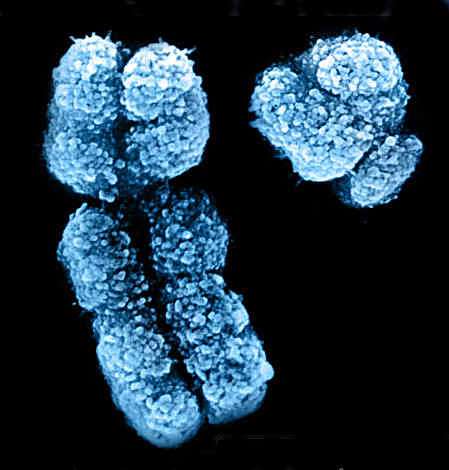From liability to viability: Genes on the Y chromosome prove essential for male survival

Despite a well-documented history of dramatic genetic decay, the human Y chromosome has over the course of millions of years of evolution managed to preserve a small set of genes that has ensured not only its own survival but also the survival of men. Moreover, the vast majority of these tenacious genes appear to have little if any role in sex determination or sperm production.
Taken together, these remarkable findings—published this week in the journal Nature—suggest that because these Y-linked genes are active across the body, they may actually be contributing to differences in disease susceptibility and severity observed between men and women.
"This paper tells us that not only is the Y chromosome here to stay, but that we need to take it seriously, and not just in the reproductive tract," says Whitehead Institute Director David Page, whose lab conducted the research with collaborators from Washington University in St. Louis and Baylor College of Medicine.
"There are approximately a dozen genes conserved on the Y that are expressed in cells and tissue types throughout the body," he continues. "These are genes involved in decoding and interpreting the entirety of the genome. How pervasive their effects are is a question we throw open to the field, and it's one we can no longer ignore."
Page believes this research will at last allow his lab to transition from proving the so-called rotting Y theorists wrong to a new era in Y chromosome biology. Over the past decade, Page, who is also a professor of biology at MIT and an investigator of the Howard Hughes Medical Institute, and his group have been debunking the thinly supported but wildly popular argument that because the Y chromosome had lost hundreds of its genes over roughly 300 million years of evolution, its ultimate extinction is inevitable.
The loss of genetic content on the Y is not in dispute. In fact, a recent study from Page's own lab showed that the human Y chromosome retains only 19 of the more than 600 genes it once shared with its ancestral autosomal partner, the X chromosome. However, by comparing the sequence of the human Y chromosome with that of the chimpanzee and the rhesus macaque, the lab discovered that the human Y has lost only one ancestral gene over the past 25 million years. Since then, the Y has been more than holding its own.
Having shown that the human, chimp, and rhesus Y chromosomes share nearly identical ancestral gene content, the lab set out in this latest work to map the evolution of the Y chromosomes of five more distantly-related mammals: the marmoset, mouse, rat, bull, and opossum. A comparison of the ancestral portions of these Y chromosomes revealed a set of broadly expressed genes across all eight species. Such genetic stability and conservation is no accident.
This is not just a random sampling of the Y's ancestral repertoire," says Page, noting that each of the conserved genes discovered has a counterpart on the X chromosome. "This is an elite bunch of genes."
"Evolution is telling us these genes are really important for survival," adds Winston Bellott, a research scientist in the Page lab and lead author of the Nature paper. "They've been selected and purified over time."
Bellott and Page say the next phase of their research is to determine what this set of Y genes is actually doing, as they concede that's simply not yet clear. What is clear, they argue, is that cells in females (which, having two X chromosomes, are referred to as XX cells) are subtly but fundamentally different from cells that are XY in males. And, they are different throughout the body in tissues and organs that show no obvious anatomic differentiation.
"They're similar but biologically different," says Bellott. "Yet, we have cell biologists and biochemists actively studying cells without any idea whether the cells are XX or XY. This is so fundamental to biology and biomedicine, and yet no one's really paid much attention to it."
Both Page and Bellott say what's needed is a biochemical catalog of the differences between XX and XY cells, including variability in such processes as gene expression and protein production. Page believes this pursuit could have enormous implications for human health.
"There is a clear need to move beyond a unisex model of biomedical research," Page says, "which means we need to move beyond a unisex model of our understanding and treatment of disease."
More information: "Mammalian Y chromosomes retain widely expressed dosage-sensitive regulators", Nature, April 24, 2014. dx.doi.org/10.1038/nature13206
Related paper: "Origins and functional evolution of Y chromosomes across mammals", Nature, April 24, 2014. dx.doi.org/10.1038/nature13151
Journal information: Nature
Provided by Whitehead Institute for Biomedical Research


















